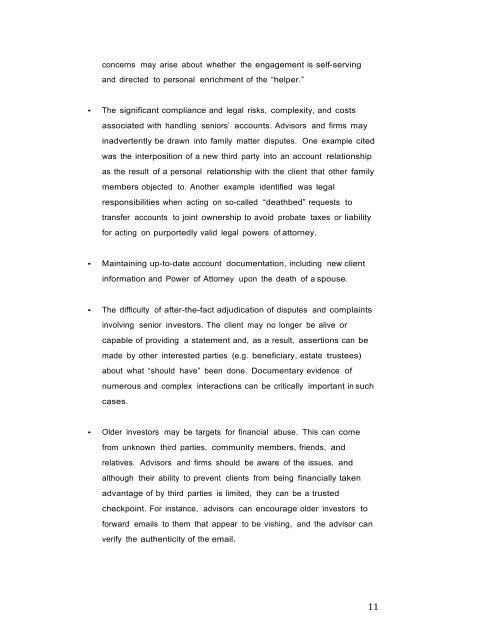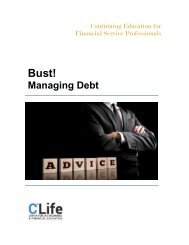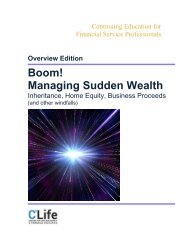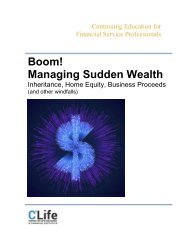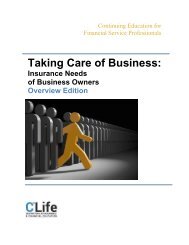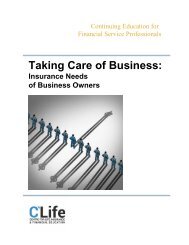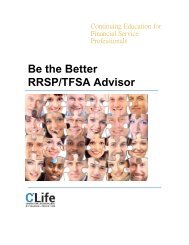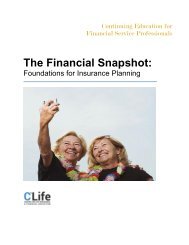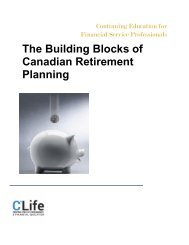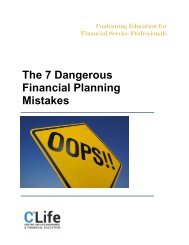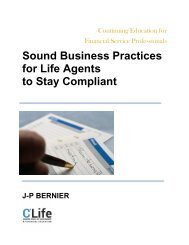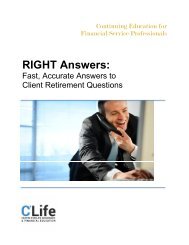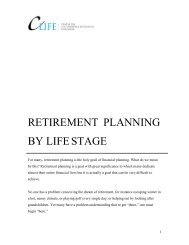Professional Responsibility and Seniors: Advisor Guidance for Ethical Practice
As a CFP professional, you need a professional responsibility CE credit annually. This course provides that credit. The focus is on ethics but you’ll read background on the challenges seniors present and thought-provoking case studies centred on seniors. Each case study draws upon FPSC® Principles and Rules to provide guidance for your responsibilities as a professional.
As a CFP professional, you need a professional responsibility CE credit annually. This course provides that credit. The focus is on ethics but you’ll read background on the challenges seniors present and thought-provoking case studies centred on seniors. Each case study draws upon FPSC® Principles and Rules to provide guidance for your responsibilities as a professional.
Create successful ePaper yourself
Turn your PDF publications into a flip-book with our unique Google optimized e-Paper software.
concerns may arise about whether the engagement is self-serving<br />
<strong>and</strong> directed to personal enrichment of the “helper.”<br />
• The significant compliance <strong>and</strong> legal risks, complexity, <strong>and</strong> costs<br />
associated with h<strong>and</strong>ling seniors’ accounts. <strong>Advisor</strong>s <strong>and</strong> firms may<br />
inadvertently be drawn into family matter disputes. One example cited<br />
was the interposition of a new third party into an account relationship<br />
as the result of a personal relationship with the client that other family<br />
members objected to. Another example identified was legal<br />
responsibilities when acting on so-called “deathbed” requests to<br />
transfer accounts to joint ownership to avoid probate taxes or liability<br />
<strong>for</strong> acting on purportedly valid legal powers of attorney.<br />
• Maintaining up-to-date account documentation, including new client<br />
in<strong>for</strong>mation <strong>and</strong> Power of Attorney upon the death of a spouse.<br />
• The difficulty of after-the-fact adjudication of disputes <strong>and</strong> complaints<br />
involving senior investors. The client may no longer be alive or<br />
capable of providing a statement <strong>and</strong>, as a result, assertions can be<br />
made by other interested parties (e.g. beneficiary, estate trustees)<br />
about what “should have” been done. Documentary evidence of<br />
numerous <strong>and</strong> complex interactions can be critically important in such<br />
cases.<br />
• Older investors may be targets <strong>for</strong> financial abuse. This can come<br />
from unknown third parties, community members, friends, <strong>and</strong><br />
relatives. <strong>Advisor</strong>s <strong>and</strong> firms should be aware of the issues, <strong>and</strong><br />
although their ability to prevent clients from being financially taken<br />
advantage of by third parties is limited, they can be a trusted<br />
checkpoint. For instance, advisors can encourage older investors to<br />
<strong>for</strong>ward emails to them that appear to be vishing, <strong>and</strong> the advisor can<br />
verify the authenticity of the email.<br />
11


